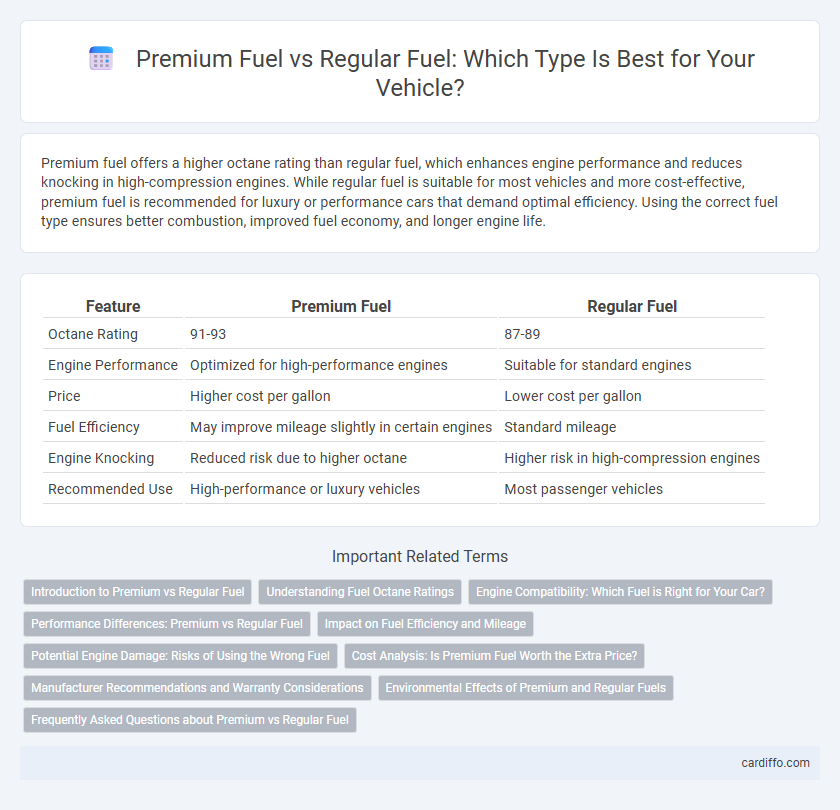Premium fuel offers a higher octane rating than regular fuel, which enhances engine performance and reduces knocking in high-compression engines. While regular fuel is suitable for most vehicles and more cost-effective, premium fuel is recommended for luxury or performance cars that demand optimal efficiency. Using the correct fuel type ensures better combustion, improved fuel economy, and longer engine life.
Table of Comparison
| Feature | Premium Fuel | Regular Fuel |
|---|---|---|
| Octane Rating | 91-93 | 87-89 |
| Engine Performance | Optimized for high-performance engines | Suitable for standard engines |
| Price | Higher cost per gallon | Lower cost per gallon |
| Fuel Efficiency | May improve mileage slightly in certain engines | Standard mileage |
| Engine Knocking | Reduced risk due to higher octane | Higher risk in high-compression engines |
| Recommended Use | High-performance or luxury vehicles | Most passenger vehicles |
Introduction to Premium vs Regular Fuel
Premium fuel contains a higher octane rating, typically 91-93, compared to regular fuel's 87-89 octane, which enhances engine performance and reduces knocking in high-compression engines. Regular fuel is formulated for standard engines and is more cost-effective for everyday driving, but may not provide optimal efficiency or power for vehicles designed for premium fuel. Choosing between premium and regular fuel depends on the manufacturer's specifications and the vehicle's engine type to ensure proper functioning and fuel economy.
Understanding Fuel Octane Ratings
Premium fuel typically has an octane rating of 91 or higher, while regular fuel usually ranges from 87 to 89 octane. Higher octane fuels resist engine knocking and allow for more efficient combustion in high-performance engines, which require precise ignition timing. Understanding fuel octane ratings helps drivers choose the appropriate fuel for their vehicle's engine specifications, optimizing performance and preventing potential damage.
Engine Compatibility: Which Fuel is Right for Your Car?
Premium fuel contains a higher octane rating, typically 91 or above, making it suitable for high-performance and turbocharged engines designed to prevent knocking and optimize combustion. Regular fuel, with an octane rating around 87, is compatible with most standard engines that do not require enhanced resistance to pre-ignition. Choosing the correct fuel depends on your vehicle manufacturer's recommendations, as using premium in an engine designed for regular fuel typically offers no additional benefit and leads to unnecessary expenses.
Performance Differences: Premium vs Regular Fuel
Premium fuel contains a higher octane rating, typically 91-93, compared to regular fuel's 87-89 octane, which helps prevent engine knocking and improves combustion efficiency in high-performance engines. Vehicles designed to run on premium fuel often experience enhanced acceleration, smoother engine operation, and better fuel economy due to optimized ignition timing. Regular fuel suits most standard engines but may cause reduced performance and potential knocking in engines requiring premium fuel, affecting overall power output and longevity.
Impact on Fuel Efficiency and Mileage
Premium fuel typically contains a higher octane rating, which can improve combustion efficiency in engines designed for it, potentially enhancing fuel efficiency and mileage. Regular fuel, with a lower octane rating, is suitable for most engines but may cause knocking in high-performance engines, reducing overall efficiency. Using the correct fuel type as recommended by the manufacturer ensures optimal engine performance and maximizes fuel economy.
Potential Engine Damage: Risks of Using the Wrong Fuel
Using premium fuel in engines designed for regular fuel offers minimal benefits, while using regular fuel in vehicles requiring premium can cause knocking and long-term engine damage. The lower octane rating in regular fuel leads to premature combustion, straining engine components and reducing performance. Consistently using the wrong fuel type can result in costly repairs due to piston damage, valve wear, and compromised catalytic converter function.
Cost Analysis: Is Premium Fuel Worth the Extra Price?
Premium fuel typically costs 20-30% more per gallon than regular fuel, but its higher octane rating can improve engine efficiency in high-performance vehicles designed for it, potentially enhancing fuel economy by 2-5%. For most standard engines, the cost-benefit ratio favors regular fuel since the performance gains from premium fuel are minimal, making the extra price often unjustifiable. Consumers should evaluate their vehicle manufacturer's recommendations and driving habits to determine if spending on premium fuel delivers tangible savings or performance improvements.
Manufacturer Recommendations and Warranty Considerations
Vehicle manufacturers specify premium fuel requirements based on engine design to optimize performance and prevent engine knocking. Using regular fuel in engines designed for premium can lead to reduced efficiency and may void manufacturer warranties. Adhering to recommended fuel grades ensures compliance with warranty terms and maintains engine longevity.
Environmental Effects of Premium and Regular Fuels
Premium fuel typically contains higher octane levels and additives that burn cleaner, reducing engine knocking and emissions compared to regular fuel with lower octane. Regular fuel may produce higher levels of pollutants such as carbon monoxide, nitrogen oxides, and unburned hydrocarbons due to less efficient combustion. Choosing premium fuel can contribute to lower environmental impact by improving fuel efficiency and decreasing harmful exhaust emissions.
Frequently Asked Questions about Premium vs Regular Fuel
Premium fuel often contains a higher octane rating, typically 91 or above, compared to regular fuel's 87 octane, which helps prevent engine knocking in high-performance vehicles. Regular fuel is generally sufficient for most standard engines and can provide cost savings without compromising efficiency or performance. Frequent questions concern whether premium fuel improves mileage or engine longevity, with experts noting that benefits are mostly limited to vehicles designed specifically to require higher octane levels.
premium fuel vs regular fuel Infographic

 cardiffo.com
cardiffo.com